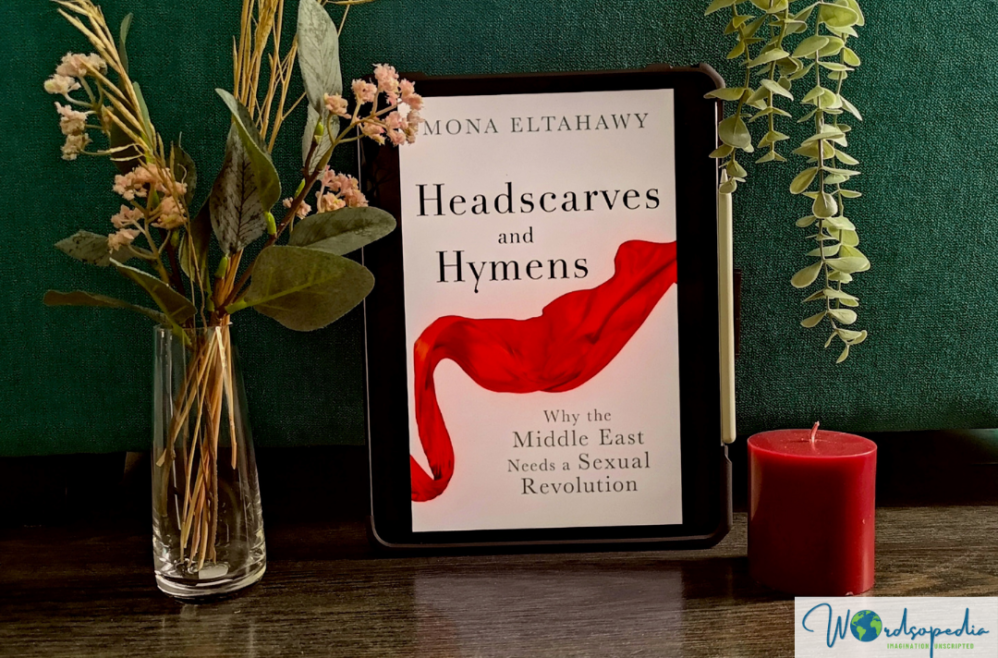Mona Eltahawy’s Headscarves and Hymens – Why the Middle East needs a Sexual Revolution is undoubtedly the most challenging book I’ve ever read. It opened windows to sufferings of my fellow women; sufferings which I’ve been unaware of and even blind to many.
At any point, I couldn’t read more than a few pages. I was angry, shocked and even in tears sometime. And yet, I continued reading. For this book deserves to be read by all, not just women from the region.
These essays are a personal narrative. It’s quite clear that a substantial amount of research has gone into this book. It’s written with such a great passion it’s hard to not get emotional while reading this book.
Divided into eight chapters, Mona Eltahawy addresses various issues in them right from headscarves, domestic violence, gender apartheid, virginity and FGM; a multitude of issues faced by women in the MENA region. All the experiences mentioned are real – either from the author’s life or are of many other brave women who have voiced their anguish.
Mona Eltahawy’s book is a voice to countless women from this region, women who have been silenced and ignored for long.
It was an eye-opener for me, as I wasn’t aware of many facets brought out in this book.
- “In Saudi Arabia, where rape and murder are among several crimes punishable by death, a father cannot be executed for murdering his children; nor can husbands be executed for murdering their wives.”
- “The Egyptian criminal code says that if a woman has been beaten by her husband “with good intentions,” no punitive damages can be obtained.”
- “In 1899, reformer Qasim Amin wrote a book called Tahrir al-Mar’a(The Liberation of Women) in which he controversially argued that the veil stood in the way of women’s progress and, by extension, Egypt’s.”
- “The Moroccan penal code, for example, provides for harsher sentences if rape and “indecent assault” result in a woman losing her virginity.”
- “In UAE, personal status laws stipulate that a woman needs the permission of a male guardian to marry, even if she is a widow or divorcée. Also, according to a law passed in 2014, a mother’s breasts are her child’s property.”
- “In Jordan, Article 308 of the penal code allows rapists to escape punishment if they marry their victims. As many as 95 percent of rape cases in Jordan are resolved with the survivors marrying their rapists.”
Mona Eltahawy raises pertinent questions when she asks –
- “Men grope and sexually assault us, and yet we are blamed for it because we were in the wrong place at the wrong time, wearing the wrong thing.”
- “Families impose curfews on their daughters so that they’re not raped or assaulted, and yet is anyone telling boys and men not to rape or assault us?”
- “But the headscarves in the title of this book and the headscarves in this chapter are not simply religious symbols. These days I am less interested in debating the religious necessity of veiling and more interested in asking what the widespread adoption of the hijab has done to the perception of women and to women’s perceptions of themselves. Are we more than our headscarves?”
I found a couple of instances deeply disturbing and thought provoking. Quoting one exchange here, which happens with the author during a train ride in Egypt–
“Why aren’t you wearing a niqab?” she asked me. Her question was chilling; I’d always found the niqab terrifying in the way it rendered the face and the individual invisible.
“Isn’t what I’m wearing enough?” I asked the woman.
“If you want to eat a piece of candy, would you choose one that is in a wrapper or an unwrapped one?” the woman in the niqab asked me.
“I’m a woman, not a piece of candy,” I replied.
She talks about how despite being life-givers, women are not in control of their own lives, someone else writes their life stories and they became mere puppets. The “purity culture” that exists across the Middle East and North Africa burdens girls and women with the responsibility for their own safety from sexual violence, and for ensuring they don’t “tempt” boys and men.
Mona Eltahawy’s writing is powerful and soul-stirring. The outcome is honest, blunt, bold, unapologetic and heart-felt.
“Words are important—to fight silence, alienation, and violence. Words are flags planted on the planets of our beings; they say this is mine, I have fought for it and despite your attempts to silence me, I am still here.”
Do I recommend this book? Yes, yes, and yes!
It’s a feminist’s voice.
It’s an eye-opener.
Wordsopedia rating 5/5
| Title: Headscarves and Hymens | Author: Mona Eltahawy |
| Publisher: Farrar, Straus and Giroux | Publication date: August 12th 2014 |
| Genre: Nonfiction–Feminist Voice | Format: Paperback |
| ISBN: 9780865478039 | No. of Pages: 256 |
Buy your copy here at Amazon
About the Author
Mona Eltahawy is an award-winning Egyptian American feminist writer and commentator. Her essays and op-eds on Egypt, the Islamic world, and women’s rights have appeared in various publications, including The Washington Post and The New York Times. She has appeared as a guest commentator on MSNBC, the BBC, CNN, PBS, Al-Jazeera, NPR, and dozens of other television and radio networks, and is a contributing opinion writer for the International New York Times. She lives in Cairo and New York City.
She writes at Feminist Giant.


1 comment
[…] First published here. […]